FER Researchers Create Mine Detection Tech, Production Won't be in Croatia
December the 6th, 2021 - A team of FER researchers have come up with some innovative and impressive mine detection technology, but it won't be producted here in Croatia.
As Poslovni Dnevnik/Darko Bicak writes, although Croatia is fortunately no longer at the top of the global list of countries with the biggest problems with landmines and unexploded ordnance from previous conflicts, the country is one of the leaders in demining technology, which could be further developed in the coming period.
After Dok-ing developed complex robotic demining systems recently, primarily due to national needs and then increasing demand across the global market, the Faculty of Electrical Engineering and Computing (FER) in Zagreb is nearing the completion of an intelligent demining technology project of all other metals found throughout the country.
From Syria to Colombia...
The team of FER researchers led by prof. Dr. Vedran Bilas from the Department of Electronic Systems and Information Processing, which includes young scientists Marko Simic and Davorin Ambrus, developed a system for recognising and distinguishing metal objects hidden in the ground, found by a metal detector, based on their shape.
Confirmation of their success is their participation in this year's eighth Mine Action Technology Workshop organided by the Geneva International Centre for Humanitarian Demining (GICHD) in Switzerland.
Professor Bilas explained that there was significant interest in their project, mostly from countries where mines are still a major security and social problem, such as Syria, Iraq, Jordan, Yemen, Cambodia and Colombia, but also humanitarian and other specialised international institutions.
"Significant contacts have been made and we expect that concrete contracts will be reached in the next few months. I'm afraid that, unfortunately, here in Croatia, there is no interest of the economy in the implementation of our technology and it will certainly need to be produced elsewhere. According to our current plans, we'll open a development company with FER that will continue to develop this technology, and the production itself will be in some other country. This is a pity because demining technology is being developed in only a few countries now,'' the team of FER researchers stated.
Bilas added that their detector, which is a combination of electro-magnetic and digital skills and artificial intelligence, is nearing completion and its commercial application can be expected within a year. Mine detectors, ie metal detectors, have been known since the Second World War and since then this technology has been perfected mainly to move towards increasingly sensitive devices, ie those that can detect much smaller metal objects.
"This is where the problems arise because there's a lot of metal left behind in places where there has been war, in urban areas and elsewhere. Another serious problem is that the soil is not magnetically neutral. Some soils are magnetically very active, such as red soil, and then you find yourself in a situation where you can't make full use of such a sensitive instrument because on the one hand it bothers you that the soil produces a certain reaction, and on the other hand you discover new objects which are generally difficult to distinguish,'' explained Bilas.
That is why, four years ago at FER, they started their own project of improving technology in the field of humanitarian demining, for which they received financial support from the Foundation "Find a better way" of the legend of British football Sir Bobby Charlton. Bilas explained that the recognition of an object by the device developed by FER researchers is based on a signal from the metal detector, and it is then necessary to know the position of the "head" of the detector in real time, while the deminer searches the ground.
"Several research groups are working on the problem of determining the position, but they haven't come to a good and acceptable solution as yet. As part of this project, we developed and tested a positioning system in which we monitor the movement of the head with magnetic field sensors. It all works really well in the lab and in real conditions. We were able to move forward with that, so, using data on the position in space and the signals of the detectors, we performed the recognition of categories of objects with the algorithms of artificial intelligence,'' noted Professor Bilas.
He concluded that although he regrets that there is no great interest of the economy and institutions in Croatia in the field of mines and related technologies, on the other hand he is glad because he shows that after decades this security problem that burdened the Croatian state and society is mostly solved.
For more, check out Made in Croatia.
Solin Company Include Begins Another Funderbeam Campaign
December the 4th, 2021 - The Solin company Include, headed by Ivan Mrvos, is turning towards the current global shortage of chips. In pursuing that goal, it has started another Funderbeam campaign.
As Poslovni Dnevnik/Ana Blaskovic writes, the Solin company Include, which is very well known for its smart benches, is launching a new Funderbeam campaign. With a more modest amount when compared to some of the previous ones, this time it aims at between 400,000 and 1 million euros of capital, but with a great ambition - to overcome the shortage of chips.
"Over the last two years, we've been working on developing new solutions so that the company can move away from the bench story in the direction of new products for cities to solve specific problems, from waste to air quality measurement," said Include's founder Ivan Mrvos, who at just 26 years of age has done more than most.
''With this round of funding, we aim to overcome the global challenges that everyone has, including that of chips. We'd ensure that we can make whole chip boards within our own production, which would allow us to buy from several sources, which would significantly speed up our production process,'' he said.
The Solin company Include currently has a “full order book until March” that includes more than a hundred products, smart benches and air quality metres. "It's about 300,000 euros worth of sold good, but they've not been delivered yet. Until then, the situation should stabilise so that we can create a stock of products, so that when customers order, we can deliver them in a few days,'' he explains. The latest Funderbeam campaign is their third in a row through that platform, and back in 2017 they became the first Croatian company on that platform.
In the year before the global coronavirus pandemic struck, they set a record for the largest Croatian campaign on that platform to date, with 1.5 million euros raised. The current round, a kind of ''pre-series B round'', is an overture to the large 5.5 million euro campaign planned for the end of 2022, about which they're already in contact with venture capital funds.
The condition for this is to scale production and revenue up to the desired 200,000 euros per month (from the current around 110,000), which opens the door for talks with larger funds, and potentially in the future is a step towards opening the doors of the United States. The Solin company Include entered the entrepreneurial scene with Steora smart benches, and at the end of 2020, it set out in the direction of solving some of the biggest global challenges we currently face.
In addition to the recently introduced Aerys air quality measurement stations, this includes Terra bins that reduce waste collection by 80 percent. Today, Include exports to 59 countries and more than 500 cities around the world.
“Since Funderbeam started, Ivan Mrvos was the first person that Ivana Gazic and I identified as a good young person for Funderbeam. This is our third campaign in just four years, and the company's valuation today stands at 17 million euros,'' said leading investor Ivana Soljan.
"Ivan has exceeded all my expectations these years. I think that Include is one of the future large companies in this area that will become a global company ", she added, and so far she has invested almost 200,000 euros in the company.
For more, check out Made in Croatia.
OPG Kalic Goes Big with Croaticanna Bio Oil, Product Now on Shelves
December the 4th, 2021 - OPG Kalic could have easily remained just like any of the other very many family farms scattered across this country. Instead, he has gone big and its Croaticanna bio oil has become very popular indeed.
As Poslovni Dnevnik/Marta Duic writes, Zvonimir Kalic, a young farmer from Djakovo, took over his family farm a few years ago, and today it produces about 30 products based on hemp, which is grown across 20 hectares of land. After entering the Start Croatia project and following orders having come in from the Spar Croatia retail chain, 2,000 pieces of his Croaticanna bio oil, which is based on hemp, arrived to the shelves of Spar stores.
This entrepreneurial story started when the Kalic family, due to the illness of one of their family members, started the planned cultivation of hemp and seed production, and today four family members are involved in the business. Zvonimir later inherited the family farm, further educated himself and created Croaticanna bio oil, which is created by cold pressing hemp seeds.
From the start, they decided to head in the direction of organic production, and the quality of Croaticanna bio oil is confirmed by three certificates and a guarantee stamp - Living Healthy as an indicator of low salt and saturated fatty acids and Bio and Vegan labels.
''Although the yields in organic production are slightly lower, in the first year we had ten tonnes of seeds on only eight hectares of land and we were awarded for the highest ecological yield as a small family farm, which put a spring in our step and provided an incentive,'' Zvonimir explained.
Croaticanna products are obtained mainly by hand, and the mission of this young farmer is to keep the path "from the field to the table" as short as possible, guaranteeing a quality product that is not harmful to the environment.
As Kalic revealed, the processing plant is located in Vrpolje, on the property of his late grandfather, and their last investment was in equipping the plant. Their investments do not stop there either, and the next step is the purchase of tea processing machines, for which they plan to withdraw funds from EU funds. In addition to their popular Croaticanna bio oil, their range includes about 30 products, from flour, protein and seeds to tea and honey with hemp and cosmetics.
''This is the first major step out onto the market for us and we believe that our other products will be on the shelves of Spar Croatia in the near future. So far, we've had sales on the doorstep and we've also sold our products at events and fairs. In the first year of business, we visited a hundred Croatian cities and events, and thanks to the cooperation with the Croatian Chamber of Commerce we had the opportunity to present our business and products at fairs in foreign markets such as Germany and Hungary,'' says Kalic.
Kalic recognised the opportunity to improve his products through the “Start Croatia” project, launched by Spar Croatia and Nova TV to help innovative entrepreneurs and startups place their products on the shelves of large retail chains. In addition to the expert team of Spar Croatia, Kalic collected documentation and certificates for the environmental supervisory body and harmonised his OPG's production process with the very strict requirements to make such placement possible. As part of the project, Zvonimir is also fighting for the title of Hit Product in 2022, along with seven other candidates.
For more, check out Made in Croatia.
Zoran Vakula and Nik Titanik Create Picture Book for Young Meteorologists
November the 29th, 2021 - Zoran Vakula the famous Croatian weatherman, and Nik Titanik, the author of many a sarcastic cartoon in the news media, have teamed up to create a picture book for young meteorologists.
As Morski writes, following "Vjetropirasta", the first meteorological picture book in the series "Vremenaste price", in which the young boy Val teaches the readers about the wind - Zoran Vakula and Nik Titanik have continued their collaboration "Oblača-stom" - in which Vedrana talks about clouds.
Of course, meteorologist Zoran Vakula writes here as well, and cartoonist and illustrator Nik Titanik draws the images. The picture book is intended primarily for the older kindergarten age group and those attending the lower grades of primary school, but as with "Vjetropirasta" - those of all ages will more than likely find flipping through these pages charming.
Vedrana helps find the answers to common questions such as: “What are clouds? How and where do they originate? How many are there and what shapes do they come in? Which are the lowest clouds and which are the highest ones? What do they produce, and how? Can they be touched? When and how can we photograph them?'' and many other questions that a child will often ask when looking up at the sky.
In addition to learning a lot, the goal of the picture book is to encourage almost the youngest among us to understand nature and its laws, and to interest them in meteorology and clarify some basic meteorological concepts to make it easier for them to understand everyday meteorological information and the process of climate change.
The publisher of the picture book is Nik Titanik Studio d.o.o., the first and only Croatian studio specialising in the production of caricatures, illustrations, comics and picture books.
For more, make sure to check out our dedicated Made in Croatia section.
Could Croatian Term Prosek Finally be Protected by European Commission?
November the 28th, 2021 - Could the Croatian term Prosek finally be protected by the European Commission (EC) and put an end to the dispute between Croatia and neighbouring Italy?
As Morski writes, On Friday, November the 26th, 2021, State Secretary Tugomir Majdak, in the presence of Member of the European Parliament Tonino Picula, participated in a panel entitled "Croatian quality on the European table - the protection of the traditional term Prosek".
The event brought together Prosek producers, oenologists and legal experts to discuss the course of protection, Croatian and Italian arguments and the problems of producers, and a day later, on November the 27th, from 10:00 to 16:00 on Petar Preradovic Square, a public blind tasting of Prosek and Prosecco was planned, with the shooting of a promotional video about the important and undoubted differences between these two wines, all with the tasting and sale of Prosek made by Croatian producers.
Back in 2013, the Ministry of Agriculture submitted a request to the European Commission for the protection of the traditional Croatian term Prosek, and this year, the European Commission closed the application review process and approved it as well-founded and justified, with an expected objection from an Italian organisation.
In order to advocate for successful protection of the Croatian term Prosek at the European level and in order to promote this Croatian wine, a panel was organised at which State Secretary Tugomir Majdak stated:
''I'm satisfied with the development of events in the process of the protection of this wine, which is extremely important for all of us in historical, tourist and gastro-oenological terms. I'd like to remind you that relatively recently, we successfully resolved another wine dispute, which was both legally and technically extremely demanding, and then our producers from Istria were given the opportunity to continue marketing the wine "Teran".
In the same way, the Republic of Croatia now has an answer related to Prosek and that's the only way in which our approach can be based in this case because we really have all the professional, historical and legal arguments for its protection. Croatian producers certainly have a legitimate right and expectation to have their products protected, which have all been produced in the traditional way and with full access to the market as their European counterparts have.
Today, Croatia has 31 products with their names registered in the EU with protected designation of origin or protected geographical indication, and is proud of seventeen protected wine designations of origin, six geographical indications on strong alcoholic beverages and one geographical indication of aromatised wine products.
For more, check out Made in Croatia.
Croatian PlantOn App Offers Users "Garden in Their Palm"
November the 26th, 2021 - The Croatian PlantOn app allows its users to access their garden ''in their palm'' from wherever they might be.
As Poslovni Dnevnik/Lucija Spiljak writes, Goran Markovanovic and Mario Salai from Slavonia created the Croatian PlantOn app, which provides its customers and producers with a "garden in the palm of your hand" experience, with direct connections between the user and the grower permitted with ease.
The user of the Croatian PlantOn app is directly connected to the producer from whom they have rented the garden, while the same producer grows vegetables for the user and sends them all of the crops from their garden to their home address.
By paying for the service, the buyer provides farmers with a fixed monthly income throughout the year, and the family does not have to worry about the placement and sale of their vegetables.
“The Croatian PlantOn app also opens up new employment opportunities for local farmers, and better quality control and product quantity planning reduces the risk of overproduction, unnecessary production and food waste. When a user asks to rent a garden, they can do so even when planting has only just begun, so the crop can be already fully sold, which provides family farms with security and additional motivation, and direct delivery ensures the better hygiene and freshness of the vegetables. The PlantOn system enables income to be kept in the hands of the ''small'' people, who will retain purchasing power and improve the economy of the more rural parts of Croatia,'' said Markovanovic.
All activities from the field are available to tenants via the Croatian PlantOn app so they can see their garden at any time. In this way, the customer gets healthy, locally grown foods easily and they even know exactly how they've been grown and where they've come from.
As Markovanovic and Salai added, the delivery of fresh vegetables from Slavonia and Baranja gardens is possible to all parts of Croatia. They have three packages - Family (eight types of vegetables), Custom (the buyer chooses everything down to the last bit) or Business, which is intended only for business entities (this is done only with large areas with the cultivation of crops of choice). In addition to growing vegetables, the app also offers seasonal nutrition tips and different recipes.
For more, check out Made in Croatia.
Innovative Croatian ScanShop App Being Tested Out by NTL
November the 26th, 2021 - The large shopping chain NTL (Narodni trgovacki lanac) has been testing out the innovative new Croatian ScanShop app in its stores.
As Poslovni Dnevnik/Lucija Spiljak writes, the NTL chain is starting to test out the Croatian ScanShop app in its stores, which allows the customer to independently scan the desired items in the store via their own mobile phone and thus skip the queues for the cash register. This is a practice already common in some large Northern European chains, such as the British Tesco.
The Croatian ScanShop app allows shoppers more time to select their products instead of standing and waiting in lines at the checkout, it reduces frustration for the customer and makes the experience more positive in general. It also provides the user with personalised content based on their shopping list and previous purchases, as well as all information about the product(s) or various promotions in individual stores.
"We're glad to have the opportunity to be the first to test out an innovative Croatian product and check the technical and operational possibilities for its implementation. With the support of small technological start-up companies, our goal is certainly to provide our customers with even greater customer satisfaction. The introduction of the Croatian ScanShop app potentially opens the possibility for the better use of the time of our employees so that they, instead of at the checkout, are at the service of customers when they're shopping and are actually choosing products,'' said the director of NTL, Martin Evacic.
As part of a European Union (EU) project, the Croatian ScanShop app has reached a stage where it is ready for use in stores, but continued testing in real conditions is a necessary prerequisite for the further development of the application to reach its full potential.
"We're happy that NTL has recognised us as a possible partner and allowed us to test out our application in real conditions. In this phase, the Croatian ScanShop app development team improve things with the support of NTL employees, and we hope that the knowledge from the test phase will enable ScanShop to progress even more, and with the support of investors, it will be available to the general public and as many stores as possible,'' said Luka Buljan on behalf of the technology team developing the application.
The development of the application was supported by European Union funds, which emphasises the financing of radical innovations with the potential for success. The total value of the project was 1.6 million kuna, of which EU funds financed 85 percent.
For more, check out Made in Croatia.
Holiday Gift Guide: 10 Croatian Brands for Your Christmas Shopping Inspiration
The season of gift-giving is upon us! We bring you a list of ideas for unique Christmas gifts to inspire you to shop local and support small Croatian businesses
How’s that Christmas shopping list going? This holiday season, we encourage you to skip the big retailers and e-commerce giants in favour of supporting small local businesses run by creative, talented and passionate people.
We’ve put together a list of 10 ideas to kickstart your holiday gift-giving, featuring Croatian brands and their amazing products that would make perfect gifts for your loved ones.
Think of this list as a starting point: once you start following any of these creatives on social media, you’ll quickly discover other entrepreneurs, artists and manufacturers showcasing their work and supporting each other in the online space. As far as rabbit holes go, this is quite a lovely one to go down, and we guarantee you’ll find plenty of inspiration along the way.
naOtoku jewelry
naOtoku is a jewelry brand whose name literally translates to ‘on the island’, pointing to the main source of inspiration for its owner Petra Markusović. While the artist is based in Zagreb these days, she originally comes from Brač island which she calls ‘a place of peace, relaxation and endless inspiration’.
This is clearly reflected in her gorgeous jewelry. It’s not only aesthetically evocative of nature, the sea and island landscapes, but quite literally contains them. Petra collects pebbles, sea glass and other bits washed ashore, then cradles them in silver and brass to transform them into unique earrings, rings and necklace pendants.
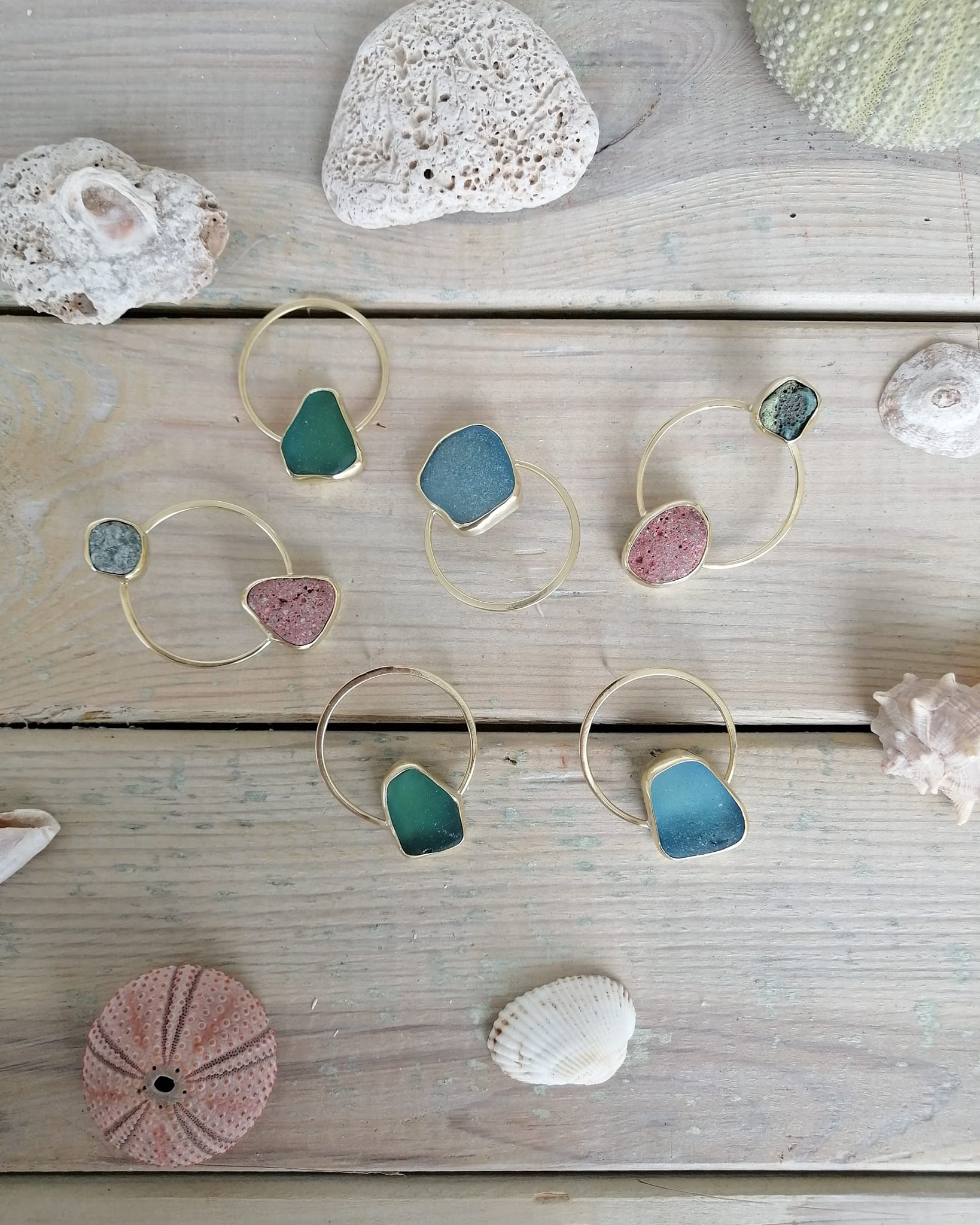
Beautifully designed and expertly crafted, naOtoku creations are statement pieces and conversation starters - whoever wears them is sure to get asked where they got those every once in a while. You can follow naOtoku on Facebook and Instagram - and good luck trying to settle on just one favourite piece.
Love around the world by Anđela & Davor Rostuhar
What do a pair of world travelers do for their honeymoon? They sure don’t go to Paris for a week. Anđela and Davor Rostuhar, a Croatian couple known for their love of adventure and awe-inspiring expeditions, got married in 2018 and then launched quite a special project. They travelled the world for an entire year, interviewing couples of all ages and backgrounds to explore what love means in every corner of our planet.
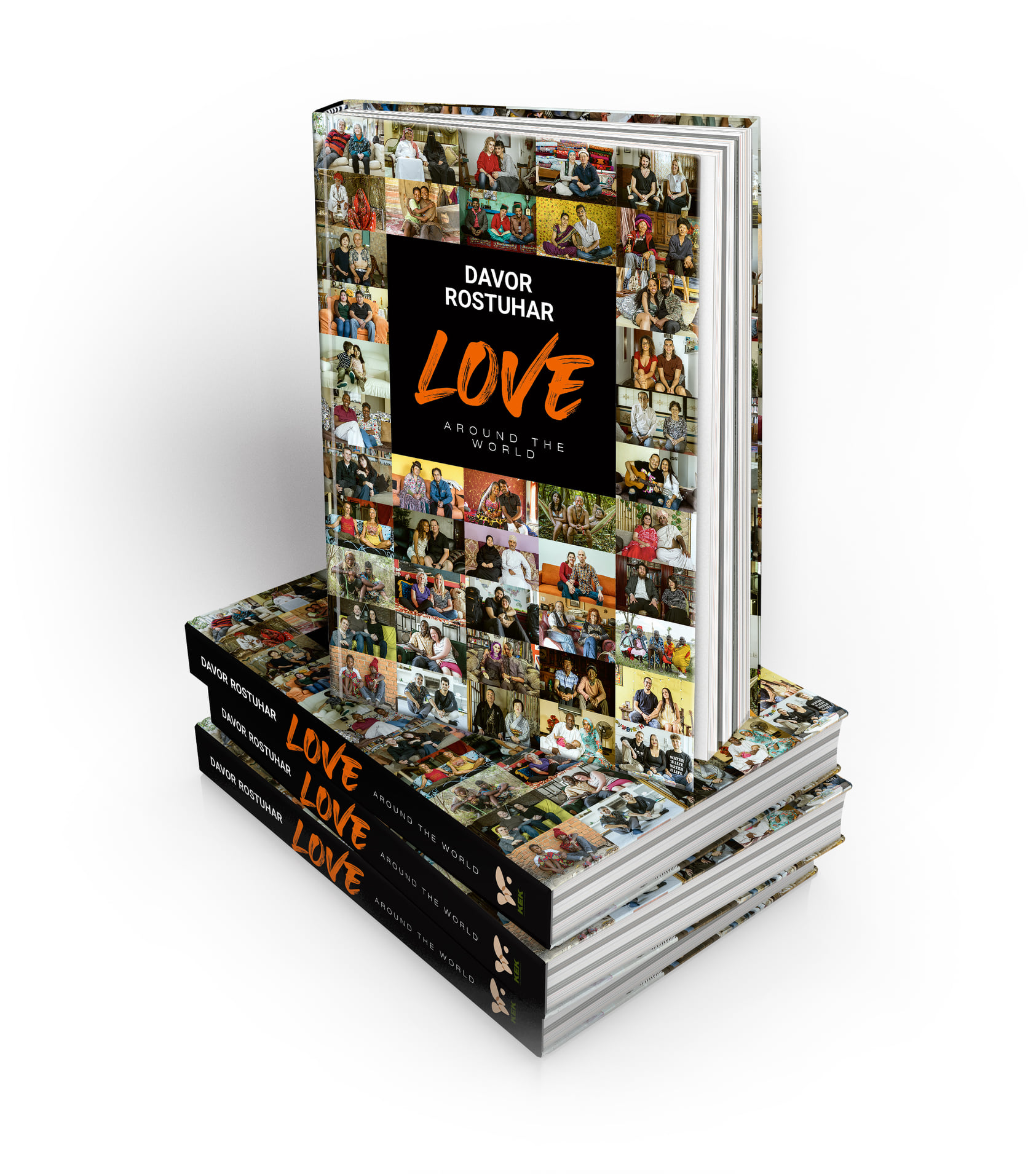
The project resulted in a poignant documentary film and a beautiful book sharing the same name, Love around the world. As described on their site, the book is ‘an intimate essay, a travel diary and an ethnographic study’, and we think a book about love would make a perfect gift this holiday season.
You can learn more about the project and purchase the book (in Croatian or English) on their website.
Chia Cups Studio
Chia Cups are one of those brands that are instantly recognizable from a single product: in their case, a beautiful white ceramic mug covered in black polka dots with the handle painted gold.
They’re so popular, there’s no shortage of copycats out there trying to imitate the famed design. And while the pattern itself is a classic you can’t exactly patent, it’s easy to spot the superior product in the bunch: Chia Cups are handmade, hand painted, glazed to glossy perfection and presented in style by their makers Filipa and Antun.
They’re about to launch their annual holiday collection on their website, so keep an eye out for festive designs featuring timeless Christmas motifs. And if you’re considering getting one as a gift, don’t wait too long: since all the cups are handmade, they are only manufactured in small quantities which typically sell out at the speed of light.
Check out the webshop here and follow Chia Cups on Facebook and Instagram.
Croatian Classics by Andrea Pisac
Few things have the ability to inspire, provide comfort and get people together like food does, and there's no better time to gather around the table and enjoy a traditional meal than the holiday season. Andrea Pisac of Croatia Honestly recently came out with a cookbook named Croatian Classics, featuring 100 recipes for savoury dishes originating from all parts of the country.
The recipes are grouped into themed chapters - not by region, ingredients or courses, but a set of Croatian-specific phrases that describe both the cooking method and the essence of a certain dish. Tell any Croatian to name a few meals ‘na žlicu’ (by the spoon) or ‘za dušu’ (for the soul), and you’ll probably find them all in this cookbook.
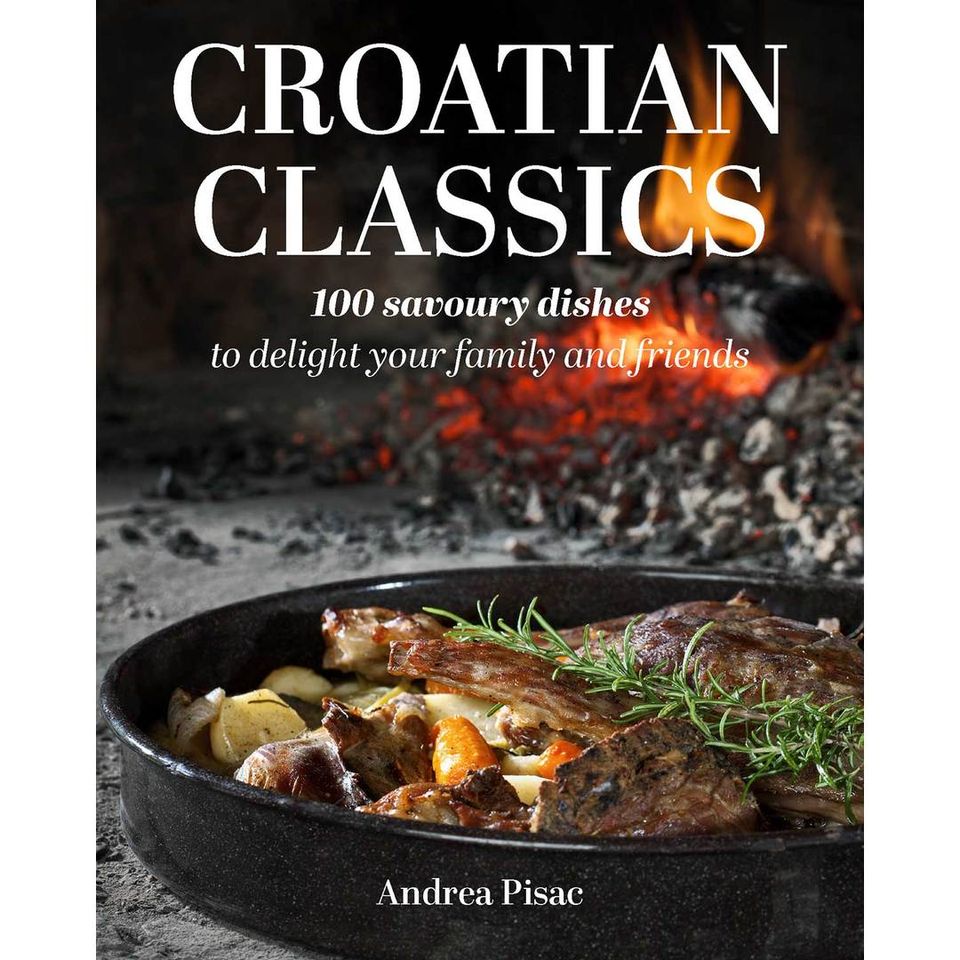
Image © Croatia Honestly / Andrea Pisac
The book is written in English, features hundreds of colour photos and detailed step by step instructions, and the ingredients are listed in metric and imperial measurements. It’s a great gift for any recipient: based in Croatia or diaspora, novices or experienced home cooks, everyone is sure to enjoy delving into this book. Whether you want to tackle our national cuisine or perhaps wish to reconnect with your roots, the Croatian Classics cookbook is a great way to start exploring the traditional Croatian gastronomy. If you want to go all out, pair it with Andrea’s first cookbook, Croatian Desserts.
The cookbook is available for purchase in the Croatia Honestly webshop.
aDORAble
Speaking about food… Let's add a dash of unique flavour to our list. Meet aDORAble, a family-run agricultural business known for organic products of outstanding quality that will take your cooking to the next level.
They make wonderful jams and hot sauces, but they’re best known for their flavoured salts. Hand-harvested in Nin, the coarse sea salt is combined with Mediterranean herbs and other organically grown ingredients such as dried fruit, vegetables, mushrooms - and even red wine! This results in over a dozen flavour combinations, varying from lemon or basil to more complex mixtures such as orange, rosemary and thyme or tangerine and fig leaf. aDORAble control every step of the production process and grow the majority of ingredients themselves.
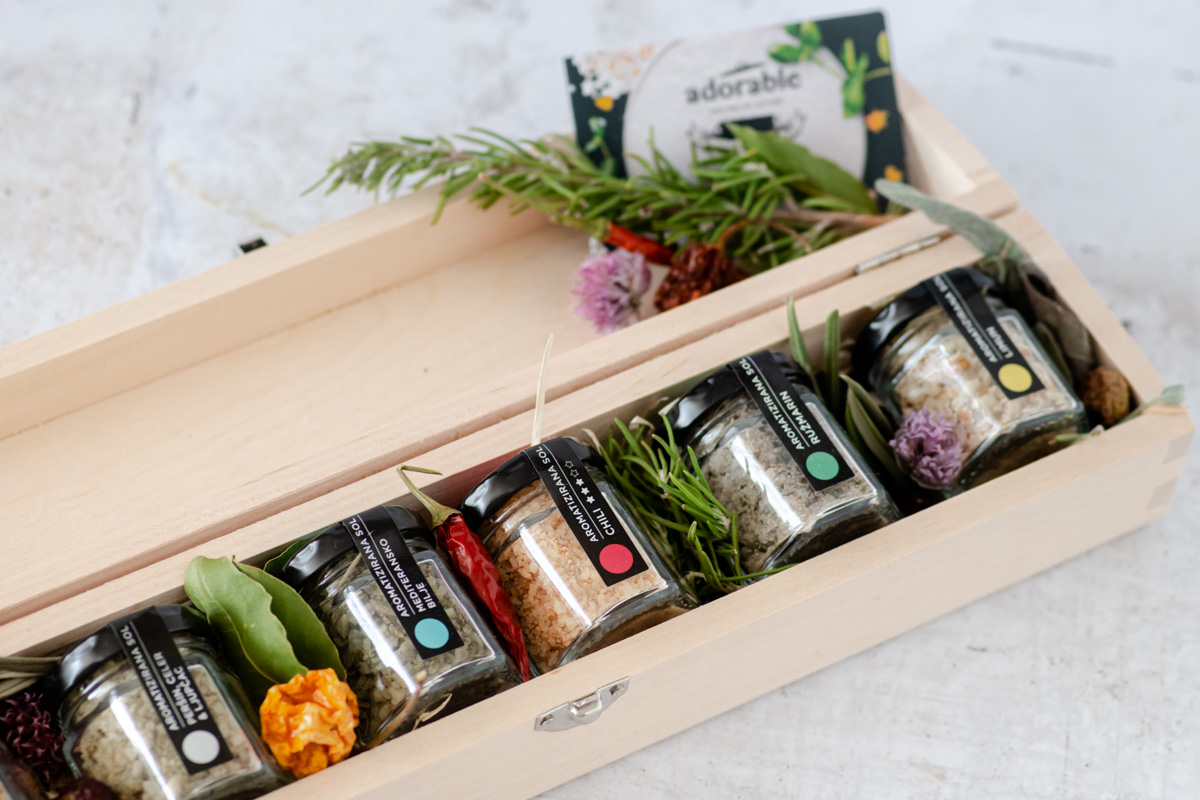 A nice combo of Mediterranean herbs, chilli and lemon. Image © aDORAble
A nice combo of Mediterranean herbs, chilli and lemon. Image © aDORAble
All aDORAble products can be purchased individually, but they also sell gift boxes that anyone who loves to cook would be happy to find under the Christmas tree. Check out their shop here - international shipping is also available upon request.
Take tha break
Why yes, we'll gladly take a break. This design brand specializes in stylish home decor and accessories made of high quality fabrics: pillows, shopping bags, totes, towels, and headbands, to name a few.
Our favourite? Their beach towels, made of waffle cotton that’s highly absorbent and doesn’t shed - the two main features you’d want in this particular item, and yet surprisingly hard to find these days. Aside from checking off all the practical boxes, they come in an assortment of dreamy summery colours and in several sizes; the bigger ones double as throws that will come in handy during those chilly, early-morning ferry rides.
And yes, December might not seem like the best time to gift beach accessories, but in our opinion, it’s never too early to start planning a summer vacation. Fancy something more seasonally appropriate? Their holiday collection is sure to bring some Christmas cheer into your home.
Follow them on Instagram and check out the products in their webshop.
Matinata - premium organic skincare
Matinata is a Croatian skincare brand whose name, philosophy and ingredients all stem from Mother Nature. Their line of active organic skincare currently counts six top-notch products, made from botanicals, plant extracts and naturally derived ingredients that have all been proven to have beneficial effects for the skin.
The organic components are carefully sourced worldwide from selected fair trade partners, thoroughly tested in collaboration with the Faculty of Pharmacy in Ljubljana, and then used to manufacture Matinata products in Croatia in small batches. The brand is based on transparency and their website offers a thorough breakdown of ingredients they use (as well as those they don’t), their purpose and benefits for the skin.
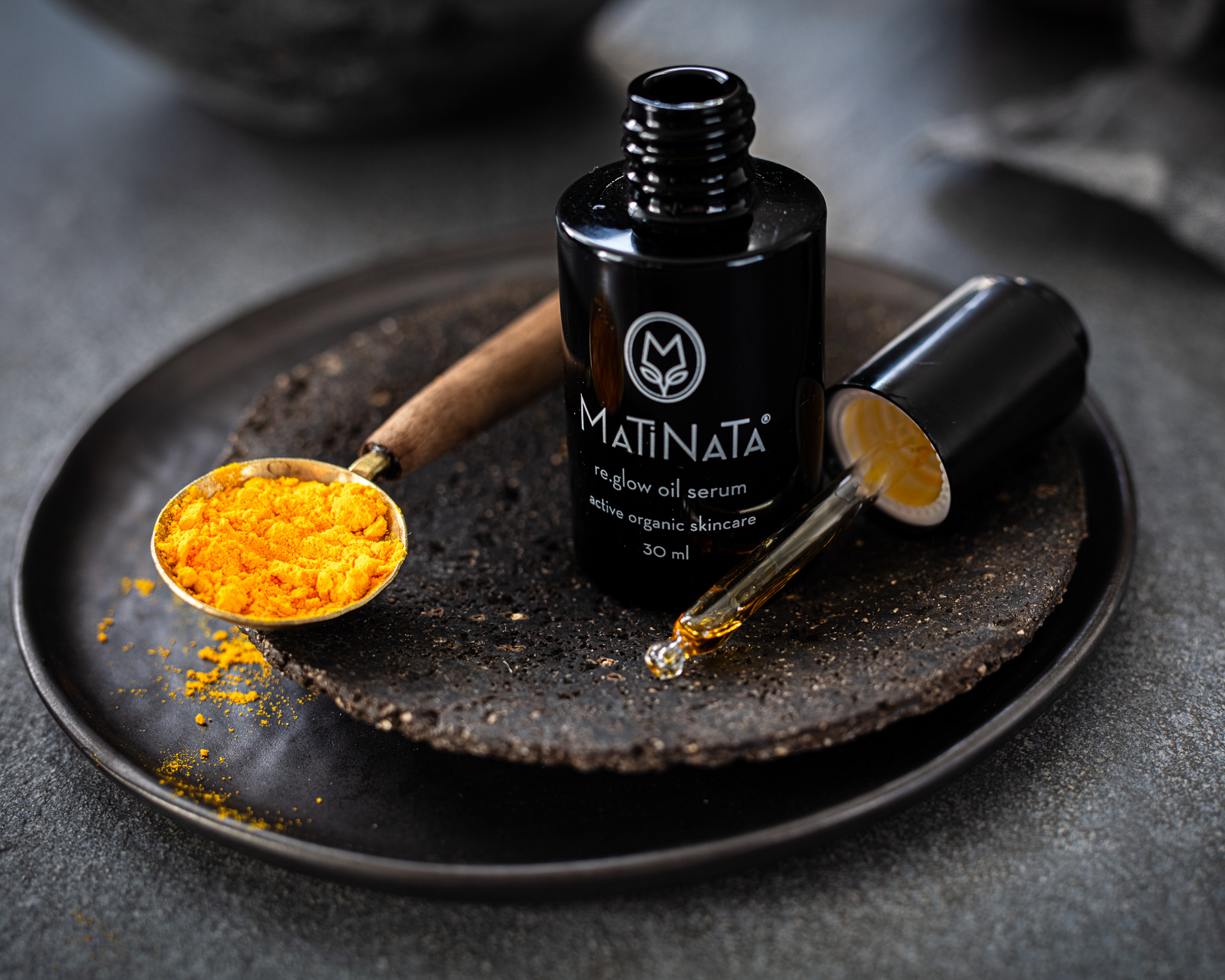
Image © Matinata skincare
From the exquisite dark glass packaging to the hypercharged formulas, Matinata products feel luxurious and transform a simple daily routine into a cherished ritual. Our favourite: re.glow, a potent nourishing oil serum that restores balance to the skin, looks like liquid amber and has an intoxicating scent that will make you want to bathe in the stuff. (No need; a few drops will suffice.) Not sure which product to go with? Their Discovery set features mini versions of all Matinata products and would make a great gift for anyone looking to explore natural cosmetics.
Learn more about Matinata on their website and follow them on Facebook and Instagram.
Better Bread by Kroštula: panettone
Okay, panettone isn’t exactly an authentic Croatian thing, but this delicious Italian sweet bread is such a Christmas classic, it’s become a holiday staple in countless Croatian households. While we’re usually happy to go with tried and tested Italian brands, it’s nice to know we have a fantastic local version as well.
This year, skip the imported stuff and try an artisan panettone instead, courtesy of Better Bread by Kroštula. They’ve got the recipe down to a T (not an easy feat, as they like to remind us in their social media posts), resulting in ethereal, fluffy goodness you can basically smell through your screen:
Two versions of panettone are available at the moment (candied fruit and chocolate), with more flavour combinations to follow. It can be purchased in their webshop and in selected stores across Croatia - check the list here and follow Better Bread on Facebook.
Bradonja i plava
Bradonja i Plava (the bearded guy and the blonde) are Josip and Maja, two creatives running a lifestyle brand formerly known as Papa Joe design. We love their jewelry and home decor inspired by traditional Croatian lace and recreated in birch wood.
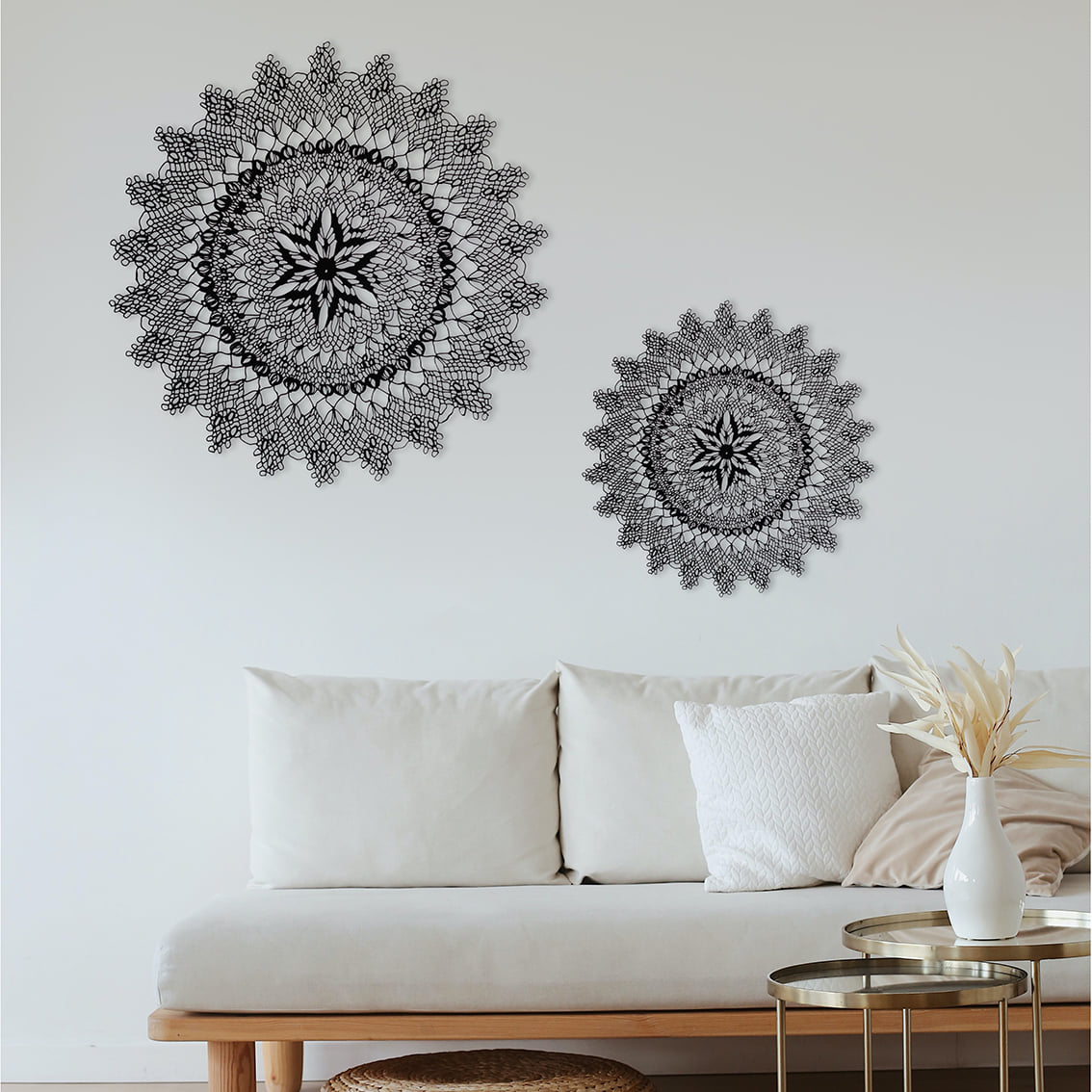 Yep, that's wood up there on the wall! Image © Bradonja i Plava
Yep, that's wood up there on the wall! Image © Bradonja i Plava
Adorn your walls in intricate designs based on Pag, Hvar and Lepoglava lace; if you’re looking for something on the smaller side, check out their delicate wooden earrings which literally represent small sections of authentic lace patterns.
Follow them on Facebook or Instagram and check out their webshop.
Likamee wool
Likamee wool is a small family business producing felted mat rugs out of sheep wool, sourced from the region of Lika and its indigenous Lika Pramenka sheep variety.
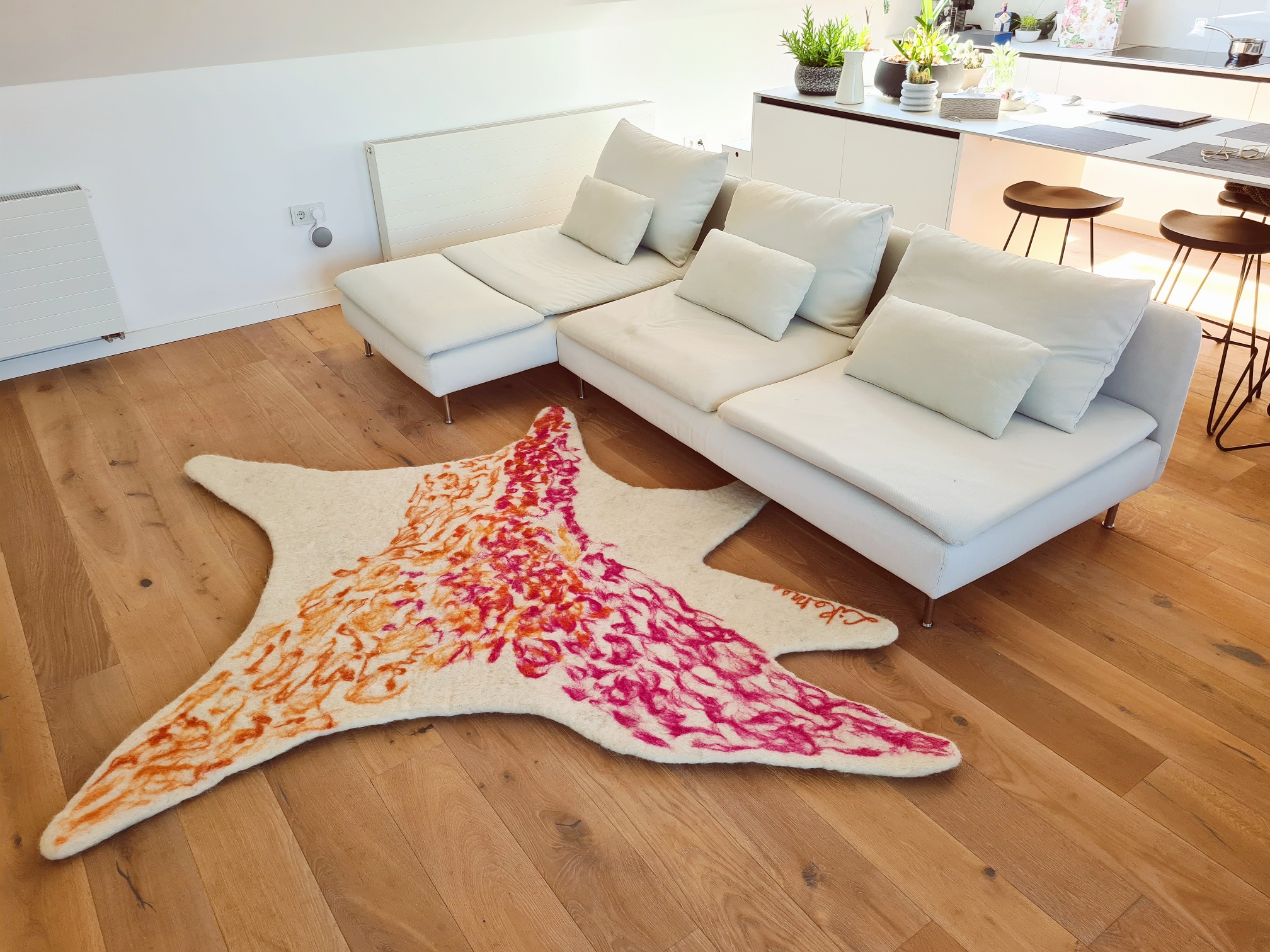 Image © Likamee Wool
Image © Likamee Wool
An incredible amount of time and work is invested in every single piece, as all Likamee rugs are manufactured entirely by hand. It’s truly a labour of love, resulting in unique, eye-catching home decor which is also animal friendly and sustainably made.
Follow them on Facebook and Instagram, where they also share snippets of the manufacturing process that will make you appreciate their craft all the more.
Croatian Informatics Company HSM Transforms Visual Identity, Business Strategy
November the 20th, 2021 - The former HSM Informatika has recently been present on the regional market under the name HSM following the transformation of its visual identity and business strategy. The Croatian informatics company HSM has also seen shifts in its market presence following these changes.
As Poslovni Dnevnik/Lucija Spiljak writes, the Croatian informatics company HSM is 100 percent domestically owned and has been present on the market for more than 30 years now. The company states that the Management Board decided to take this step after the company's management changed. Namely, HSM is a family company that is now run by the new Management Board under the leadership of Juraj and Jakov Urbanke and Jelena Jelinic Cvirn.
In addition to the change in visual identity, the Croatian informatics company HSM has gone through a change in business strategy that has greatly affected their current market presence and position. From a company that in previous years relied on a large part of its business on a partnership and distribution relationship with Adobe, HSM has made a significant shift in the way it does business and now primarily focuses on the implementation of solutions and consulting services related to the global CRM platform Salesforce.
Since the implementation of the Salesforce platform, HSM has already established cooperation with some of the largest companies active here on the Croatian market such as - Greyp, Nexe Group, ZSEM, Icertias, Matison and various Croatian media companies, all of which use their solutions to encourage and develop their business. In addition, during the ongoing coronavirus pandemic, they used internal resources and developed their own Project management and HR application (app), which are being very successfully implemented by their business users and which were also developed on the aforementioned Salesforce platform.
Last year, which was extremely difficult for most economically, the Croatian informatics company HSM's revenues increased by as much as 57 percent when compared to 2018, while the current year of 2021 has already seen the company exceed the record year of 2020. Jakov Urbanke, the director of Business Solutions at HSM, says that they are recording growth not only in terms of revenue, but also in customer interest in their solutions, primarily in the field of CRM services.
"Our plans are really big. Although we're growing, we want to continue to be an affordable consultant for digital business solutions that help companies simplify business processes and improve their business and market position. Our goals and business focus are focused on expanding our business in Croatia's immediate region, but I also see potential in markets outside of the general Adriatic area. The new HSM is an agile company with great energy and quality consultants, and I believe that with this move we'll have success in both the European and global markets,'' said Urbanke.
Today, the Croatian informatics company HSM bases its business on solution implementation services on the Salesforce platform and via consulting services, but they still plan to strengthen their strong long-term regional presence and their position as a distributor for software and hardware solutions.
For more, make sure to check out our dedicated business section.
Filip Koprcina Runs Startup Aimed at Lessening Climate Change Consequences
November the 20th, 2021 - Young Croat Filip Koprcina runs a startup which has the primary aim of lessening the dire consequences of climate change, which is as much of a threat now as ever.
As Lucija Spiljak/Poslovni Dnevnik writes, Filip Koprcina has always been interested in renewable energy sources and environmental protection, and he decided to act strongly on this issue. This 25-year-old Croat runs a successful startup called Energy Shift, a platform that allows people to invest and co-own solar power plants. contribute to the environment and generate revenue. He wanted, as he says, to make a change here in Croatia and the European Union, and then on a global level.
“People have the opportunity to make a profit of 10-15 percent per year while reducing their CO2 emissions. We currently have more than 1000 European citizens who have expressed their interest in investing more than 15 million kuna into solar energy. I used European youth programmes and through Erasmus for young entrepreneurs I worked in Ukraine for three months with a company that installs solar panels. There I learned how the whole process of installing solar panels works, how to install panels and a few so-called ''tips & tricks'' of the energy business. For the past 12 months, I've volunteered in Cyprus through the European Solidarity Force (ESF), with the aim of raising awareness of sustainable development goals,'' said Filip Koprcina, who is currently the EU Climate Pact Ambassador.
For his platform, Filip received the European Union Sustainable Energy Award for the democratisation of solar energy ownership, in the Youth Energy category.
''Back in May this year, we received an initial investment from the European Institute of Innovation and Technology (EIT) through their Digital venture programme. We're currently negotiating with several international investors about the next round of financing. We want to open new markets and expand throughout Europe,'' revealed Filip Koprcina.
He says that many citizens can install solar panels on the roof of their house, but they can't be very competitive in terms of earnings due to the current Croatian laws and those beyond the country's borders. Despite those obstacles, this young man has a vision and an idea of how to stimulate the Croatian economy and create new green jobs in Croatia through investments in renewable energy.
''The return on investment varies from country to country. It depends on the general price of electricity, the amount of sunshine that the country/location gets, but in general the return is between 15-25 percent. For example, in Croatia we have 220-250 sunny days, while in Cyprus there are typically 320-340 sunny days a year, while the price of electricity is twice as high as it is here in Croatia. At the moment, there's no discussion about the possibilities and cost-effectiveness of solar energy in the first place. Last year, Croatia imported 40 percent of the electricity we consumed, and only 1 percent of the energy we produce comes from solar power plants. We also import oil and coal and gas, which we need for the production of electricity, and we allocate over 12 billion kuna a year for that alone. Solar energy is also a fantastic investment in the long run because solar panels produce energy and have guarantees of 20-30 years, while many solar panels produce energy even after 40 years,'' Filipa Koprcina pointed out.
He also noted that Croatia hasn't invested significantly in energy projects in the last 30 years, and that HEP's profit goes to the state budget instead of, for example, to new investments and capacities.
"Croatia is an energy-dependent country. We import about 50 percent of our energy worth up to 12 billion kuna. Of that, we import 100 percent of our coal, 90 percent of our oil, 70 percent of our gas and about 40 percent of our electricity. Croatia has almost no industry, and, according to Worldometers, our share in global greenhouse gas emissions is 0.05 percent, while in the EU we have the 4th lowest carbon footprint of all member states.
During the COP in Glasgow, Prime Minister Andrej Plenkovic announced the cessation of coal energy production at the Plomin thermal power plants by 2033 at the latest, which will further reduce our CO2 emissions. Currently, 75 percent of the carbon emissions in the EU come from energy production and use, while the EU as a whole is dependent on energy imports, mostly oil and gas. The EU imports 73 percent of its oil and 15 percent of its gas, and the largest supplier of all is Russia, which can geopolitically influence EU policies.
That's why Croatia has started the LNG terminal project on Krk, and that's why the entire EU wants to become an energy-neutral bloc. One proposal I made as a member of the Technical Working Group at the UN High-Level Dialogue, and I'd now like to give it to the Croatian Government, is to abolish the tax on investments in renewable energy (VAT + customs duties on equipment imports). This would immediately reduce the investment costs of companies and individuals by 25-30 percent, and would increase the return on investment, thereby simply increasing investment in the energy sector,'' explained Filip Koprcina.
This energy-conscious entrepreneur wants Energy Shift to become the leading platform through which individuals invest in the world’s long-term renewable energy, to contribute to the energy transition. In addition, he has a great desire for his company to become a new Croatian ''unicorn''.
For more, check out Made in Croatia.


